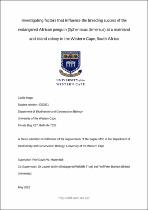| dc.contributor.advisor | Maneveldt, Gavin W. | |
| dc.contributor.author | Hugo, Corlie | |
| dc.date.accessioned | 2022-05-30T12:38:42Z | |
| dc.date.issued | 2022 | |
| dc.identifier.uri | http://hdl.handle.net/11394/9124 | |
| dc.description | >Magister Scientiae - MSc | en_US |
| dc.description.abstract | Since the 1950s the global seabird population have declined by 70% and today some penguin species are amongst the most threatened seabirds in the world. The African penguin (Spheniscus demersus) population experienced a sharp decline in the twenty first century, which led to the species being listed as endangered in 2010. African penguins are facing a range of threats including limited food resources, habitat degradation, pollution from oil spills and predation.
This study aims to compare the breeding success and chick condition of African penguins at Stony Point and Dyer Island. The study contributes to the analysis of long-term monitoring of demographic data, identified in the Biodiversity Management Plan for the African penguin. The study took place at two penguin colonies in the Western Cape of South Africa. | en_US |
| dc.language.iso | en | en_US |
| dc.publisher | University of Western Cape | en_US |
| dc.subject | Seabirds | en_US |
| dc.subject | Pollution | en_US |
| dc.subject | Breeding | en_US |
| dc.subject | Africa Penguin | en_US |
| dc.subject | Western Cape | en_US |
| dc.title | Investigating factors that influence the breeding success of the endangered African penguin (Spheniscus demersus) at a mainland and island colony in the Western Cape, South Africa | en_US |
| dc.rights.holder | University of Western Cape | en_US |
| dc.description.embargo | 2023 | |

